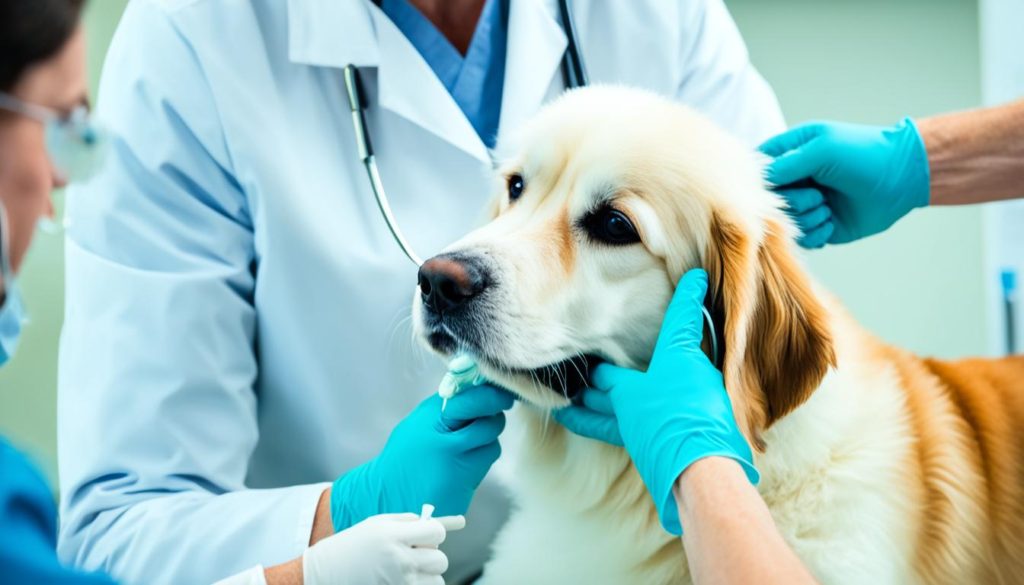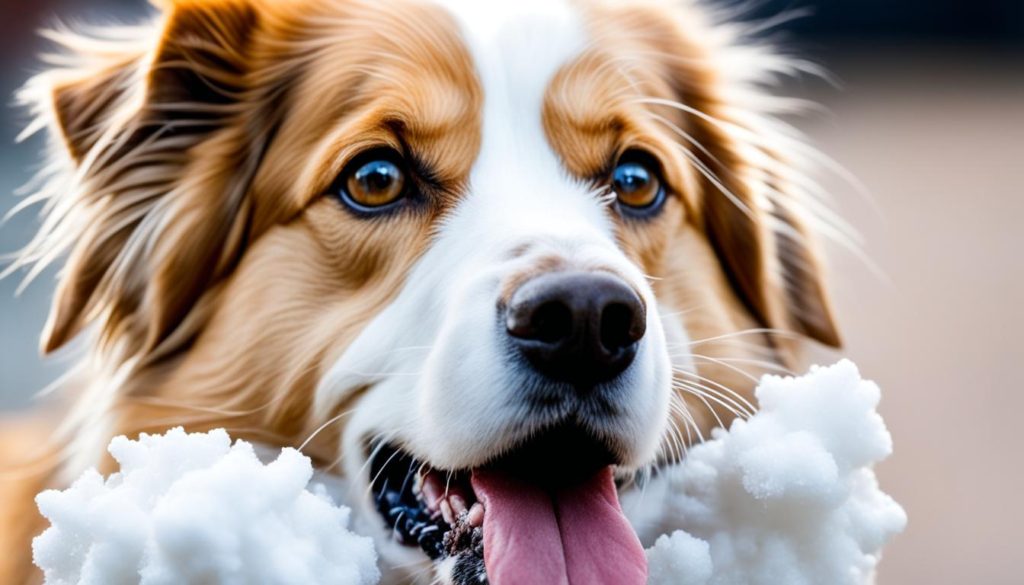Foaming at the mouth in dogs can be a distressing sight for pet owners. If you’ve noticed your dog experiencing this symptom, you may be wondering, “Why is my dog foaming at the mouth?” Fortunately, there are various potential causes for this behavior, ranging from mild to more serious issues.
Some common reasons for a dog foaming at the mouth include rapid panting, excitement or stress, nausea or car sickness, overexertion and heat, dental diseases, infectious diseases, bloat, poisoning, teething in puppies, kidney and liver failure, seizures, anaphylaxis, and disorders in the saliva glands or mouth.
If your dog is foaming at the mouth, it’s essential to pay attention to accompanying symptoms and consider seeking veterinary care if needed. This article will explore the common causes, symptoms, and treatment options for dogs foaming at the mouth, providing you with the information you need to best care for your furry friend.
Key Takeaways:
- Multiple factors can contribute to a dog foaming at the mouth, including excitement, stress, dental diseases, infectious diseases, and more.
- Behavioral changes, such as restlessness, excessive drooling, and aggression, may accompany foaming at the mouth in dogs.
- Physical symptoms like rapid breathing, muscle tremors, and seizures can also occur alongside foaming.
- If your dog is only experiencing mild foaming without any other concerning symptoms, it may not be a cause for immediate alarm.
- However, if the foaming persists or is associated with other worrisome signs, it’s crucial to seek veterinary attention for a proper diagnosis and treatment plan.
Common Causes of Foaming at The Mouth
There are numerous reasons why a dog may foam at the mouth. Understanding these causes can help you identify and address the underlying issue. Here are some of the most common causes:
- Excitement: Dogs can become so excited that they start drooling excessively, leading to foaming at the mouth.
- Stress and Anxiety: Similar to humans, dogs can experience stress and anxiety that manifests as drooling and foaming at the mouth.
- Nausea or Car Sickness: Dogs may drool and foam from the mouth when they feel nauseous or experience motion sickness during car rides.
- Overexertion and Heat: Excessive exercise, especially in hot weather, can cause dogs to pant heavily and drool excessively, resulting in foaming at the mouth.
- Dental Diseases: Poor oral health, gum infections, or dental decay can cause excessive drooling and foaming.
- Infectious Diseases: Serious illnesses like rabies can cause abnormal drooling and foaming at the mouth in dogs.
- Bloat: This life-threatening condition can cause excessive drooling and foaming due to stomach distension and discomfort.
- Poisoning: Ingesting toxic substances can lead to various symptoms, including excessive drooling and foaming.
- Teething in Puppies: Puppies experience increased drooling and foaming when their teeth start coming in.
- Kidney and Liver Failure: Advanced kidney or liver disease can cause dogs to drool excessively and foam at the mouth.
- Seizures: Seizures can trigger excessive drooling and foaming in dogs.
- Anaphylaxis: In severe allergic reactions, dogs may exhibit symptoms like drooling and foaming at the mouth.
- Disorders in the Saliva Glands or Mouth: Problems with the saliva glands or oral cavity can lead to increased drooling and foaming.
Understanding the potential causes of foaming at the mouth in dogs can help you identify when it might be a cause for concern and seek appropriate veterinary care. Monitoring your dog’s behavior and consulting with a veterinarian can help determine the best course of action to address the underlying issue.
Symptoms Accompanying Foaming at The Mouth
When a dog is foaming at the mouth, there are often accompanying behavioral and physical changes. These symptoms can provide valuable insights into the underlying cause of the foaming. It is important to observe your dog’s behavior and note any changes that occur alongside the foaming.
Behavioral Changes
Some common behavioral changes that may accompany foaming at the mouth include:
- Restlessness or agitation: Your dog may appear restless, pacing back and forth or unable to settle down.
- Excessive drooling or licking of the lips: You may notice an increase in saliva production, with your dog constantly licking their lips or drooling excessively.
- Disorientation or confusion: Your dog may seem disoriented or confused, exhibiting unusual behaviors or appearing unaware of their surroundings.
- Increased excitability or aggression: Foaming at the mouth may cause your dog to become more excitable or aggressive than usual.
Physical Changes
In addition to behavioral changes, there are physical changes that you may observe in a dog foaming at the mouth:
- Rapid or labored breathing: Your dog’s breathing may become fast or irregular, indicating a potential issue.
- Rapid heart rate or palpitations: An elevated heart rate can accompany foaming at the mouth and may be a cause for concern.
- Muscle tremors or spasms: You may notice involuntary muscle movements, such as tremors or spasms, in your dog’s body.
- Seizures or convulsions: Foaming at the mouth can be a sign of seizures or convulsions, which require immediate attention.
Depending on the severity of these symptoms, it is crucial to determine whether emergency veterinary care is necessary. If you observe any of these symptoms alongside foaming at the mouth, it is recommended to seek professional help as soon as possible.
Treatment options for foaming at the mouth will depend on the underlying cause. In some cases, medications may be prescribed to address the specific condition or issue leading to the foaming. It is essential to consult with a veterinarian to accurately diagnose the cause of the symptoms and develop an appropriate treatment plan.
Should I be worried if my dog is foaming at the mouth?
Foaming at the mouth in dogs can be concerning for pet owners, but it is not always a cause for alarm. In many cases, foaming at the mouth is simply a result of excessive drooling and can be caused by normal behaviors like excitement or exercise. However, if the foaming is accompanied by other concerning symptoms or if it persists for an extended period of time, it is important to seek veterinary attention.
If your dog is foaming at the mouth and experiencing other symptoms such as restlessness, disorientation, muscle tremors, or seizures, it could be a sign of a more serious underlying condition. These symptoms may indicate a dental disease, infection, poisoning, or organ failure.
When you notice your dog foaming at the mouth, it’s essential to observe their behavior and note any additional symptoms. If you’re unsure whether the foaming is normal or cause for concern, it’s always better to err on the side of caution and consult with a veterinarian.
Treatment options for foaming at the mouth in dogs depend on the underlying cause. In some cases, a simple change in environment or behavior modification may be all that’s needed. However, if a medical condition is to blame, your vet may recommend medications, dental treatment, or other interventions to address the issue.
In the next section, we will discuss the symptoms that often accompany foaming at the mouth in dogs, helping you better understand when to seek veterinary care.

Conclusion
Understanding the common causes of foaming at the mouth in dogs and being aware of the accompanying symptoms can help you determine when veterinary care is necessary. To prevent your dog from foaming at the mouth, it is important to take proactive measures. One of the key steps you can take is to prioritize dental health. Regular dental check-ups, proper oral hygiene, and providing chew toys can help prevent dental diseases that may contribute to foaming at the mouth.
In addition to dental care, it is crucial to keep your dog safe from potential toxins. Be mindful of substances such as chemicals, medications, certain plants, and human foods that can be harmful to dogs. By keeping these hazardous items out of your dog’s reach, you can minimize the risk of poisoning and subsequent foaming at the mouth. Remember to consult your veterinarian for a list of dangerous substances to watch out for.
If your dog does experience foaming at the mouth, it is important to seek veterinary attention to determine the underlying cause and develop an appropriate treatment plan. Depending on the specific issue, your veterinarian may prescribe medications or recommend other interventions to address the root cause of the foaming. Prompt and proper medical care will help ensure the well-being of your furry companion.
FAQ
Why is my dog foaming at the mouth?
There are numerous reasons why a dog may foam at the mouth. Some common causes include rapid panting, excitement or stress, nausea or car sickness, dental diseases, infectious diseases like rabies, bloat, poisoning, teething in puppies, kidney and liver failure, seizures, anaphylaxis, and disorders in the saliva glands or mouth.
What should I do if my dog is foaming at the mouth?
When your dog is foaming at the mouth, it’s important to assess the accompanying symptoms and behavior. If the foaming is severe or prolonged, or if your dog shows signs of distress such as labored breathing or seizures, it is recommended to seek emergency veterinary care. If it’s a minor case, you can monitor your dog and contact your veterinarian for further guidance.
Are there any dangerous situations related to dog foaming at the mouth?
While foaming at the mouth itself may not always be dangerous, it can indicate an underlying medical issue. In cases where the foaming is caused by serious conditions like seizures, poisoning, or rabies, it can be potentially life-threatening. It’s important to consult with a veterinarian to determine the cause and appropriate treatment.
What are the symptoms that can accompany foaming at the mouth?
Dogs foaming at the mouth may exhibit behavioral changes such as restlessness, excessive drooling, disorientation, and increased excitability or aggression. Physical changes may include rapid breathing, rapid heart rate, muscle tremors, and seizures. These symptoms may vary depending on the underlying cause.
How can I prevent my dog from foaming at the mouth?
Preventive measures include regular dental care, good oral hygiene, and keeping your dog safe from potential toxins and dangerous situations. It’s also important to promptly address any underlying health issues that may contribute to foaming at the mouth. Your veterinarian can provide guidance on preventive care specific to your dog’s needs.
